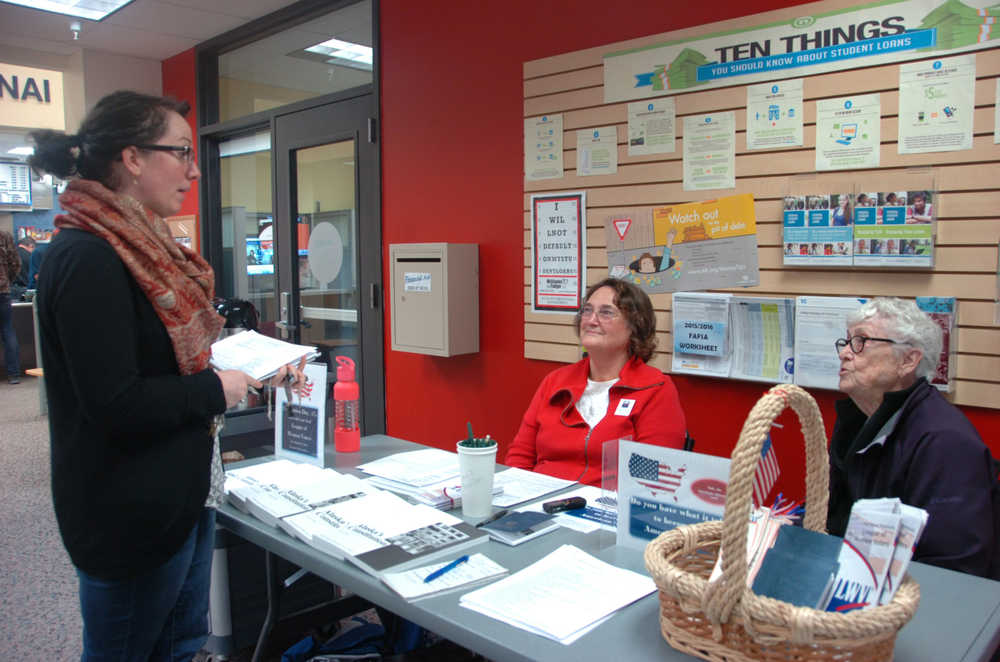With local elections around the corner, members of the Central Peninsula League of Women Voters took to the halls of Kenai Peninsula College’s campus to add students to the ranks of Alaska’s voters.
From 10 a.m.-2 p.m., the women took shifts at a table set up in the McLane Commons, passing out flyers and encouraging students to register to vote. In total, league members got eight people to register or re-register.
Getting young people to engage in politics is no easy feat, said Brandi Kerley, a graduate student and a developmental adviser at the college. Kerley registered to change her party affiliation before trying to encourage students in the commons to register themselves.
“Just in walking around the room and talking to people and asking them if they were registered or if they voted, half of them didn’t know, and the other half was, ‘Why should I?’” Kerley said. “If you ever look at something and you say, ‘I don’t really like the way that’s working,’ or, ‘I don’t like the way they’re doing that,’ the only way you’re going to get it to go your way is if you speak up, if you vote.”
Gail Knobf, the league’s current chapter president, said she had a conversation with one male student that showed it isn’t necessarily that young people don’t care about politics. Rather, many have issues with the candidates and voting.
“He did not find anybody that was running for anything that he wanted to vote for, but he had a lot of interesting ideas for improving life as we know it,” Knobf said.
Kerley cited the busy schedules of students or young professionals as one reason for falling behind on familiarity with the issues or candidates up for election.
Kerley said it is up to politicians to give young voters a reason to show up to the polls. Many students feel like candidates are too far removed from the way they live and the things they care about, she said.
“How is it relevant to them?” Kerley said. “These, you know, bigwigs in their suits… they try to put on a baseball cap and make it look like they belong. They’ve never worn a baseball cap before in their life. What is it about them and whatever issues they’re espousing that is relevant to me in any way?”
Despite the difficulty that comes with engaging students, securing those young voters is essential for a balanced voting pool. Knobf said the earlier people begin voting, the better.
“The younger that people start in the voting process, it becomes a lifelong habit,” Knobf said. “So, those kids that are taken to the polls with their parents, before they’re even at voting age, are more likely to continue in that habit in the rest of their lives. It just increases that number of voices that are heard, and that’s what makes a democracy.”
Knobf said it was a “happy coincidence” that their student registration efforts coincided with National Citizenship Day. Shauna Thornton, the college’s Student Government adviser, called the league and asked them to come entice students to register specifically on that day.
Knobf and the chapter’s former president, Lois Pillifant, also hope to target students through avenues that could make it easier to get them registered, they said. In addition to supporting an initiative to tie Alaska’s Permanent Fund Dividend applications to voter registration, the league supports pre-registration for high school students.
“Normally what we do is at the end of the school year — in May, we go to the high schools and register all the seniors,” Pillifant said.
With measures in place to ensure more students were registering to vote, Pillifant said the league would be able to shift its resources and efforts to focus on other goals.
“We’d probably try to focus on getting people to the polls, and also one of our other focuses is holding forums which bring the issue of the day in front of the public,” Pillifant said.
Reach Megan Pacer at megan.pacer@peninsulaclarion.com.

